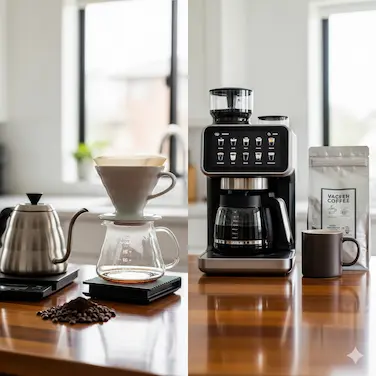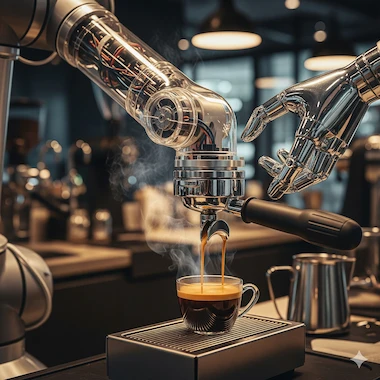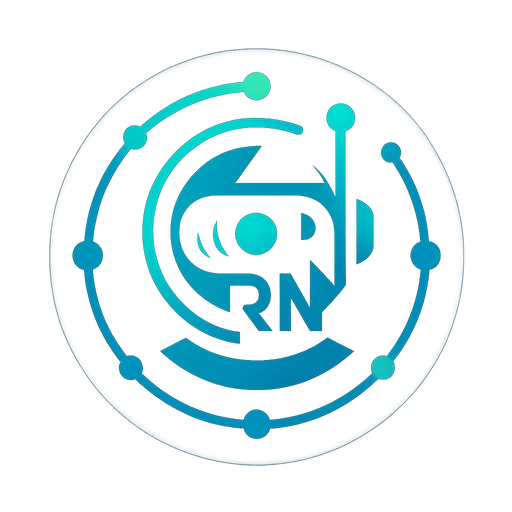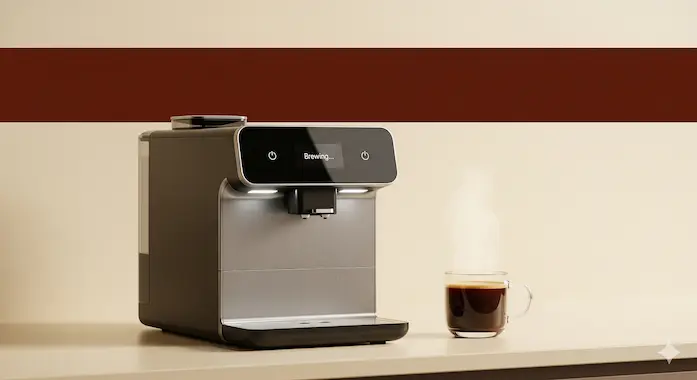1. INTRODUCTION: A NEW DAWN FOR COFFEE LOVERS
For centuries, brewing coffee has been a ritual of patience and instinct. A kettle, a filter, and a little trial and error defined the craft. But now the familiar morning ritual is colliding with artificial intelligence. Enter the AI coffee machine a device that doesn’t just brew, it learns, adapts, and remembers.
These machines promise a personalized coffee experience that’s consistent, convenient, and remarkably precise. The idea is simple: instead of adjusting dials and hoping for the perfect espresso, an intelligent system monitors variables like water temperature, grind size, and extraction curves, then quietly tunes them in real time.
What used to take a barista years of experience can now be encoded into sensors and algorithms.
Table of Contents
2. THE BRAIN BEHIND THE BREW: HOW AI-POWERED BREWING WORKS
At the heart of an AI coffee machine lies a web of sensors, processors, and algorithms. The system gathers data from every cup: flow rate, bean freshness, pressure curves, even ambient humidity. A machine learning coffee maker takes those inputs and builds a flavor model unique to the drinker.
Over time, the system predicts preferences with uncanny accuracy. Want a brighter cup from an Ethiopian roast? Or a slightly creamier shot of espresso? The machine adapts automatically. This AI-powered brewing doesn’t just reproduce recipes, it evolves them
2.1 Espresso Optimization With AI
Espresso is notoriously tricky. The tiniest changes in grind size or pressure can make a shot bitter or weak. With espresso optimization with AI, those subtle adjustments happen instantly. Algorithms track extraction yield, crema texture, and flavor balance, tuning each parameter on the fly. The result is a shot that hits the sweet spot more consistently than even a skilled barista on a busy morning
3. AI COFFEE MACHINES: BEYOND BREWING
A smart coffee machine isn’t only about taste. It integrates into daily routines and digital lifestyles. As a smart home coffee maker, it can be paired with Alexa or Google Assistant, scheduled through an app, or even triggered from bed.
The advantage isn’t just convenience, it’s efficiency. These machines support automated coffee brewing, reducing waste by calibrating beans and water precisely. Families benefit from a coffee machine with user profiles, where each person’s preferences are stored and recalled at the press of a button.
4. OLD BREWING VS AI Brew 3× Faster: TASTE AND ECONOMY
4.1 Taste Difference
Traditional brewing depends heavily on skill and consistency. Two cups, even from the same beans, often taste different. In contrast, an AI coffee machine reduces variability. Each brew is analyzed, logged, and improved. For casual drinkers, that means fewer disappointing cups. For enthusiasts, it means experimentation backed by data.
Old vs. New: Traditional Brewing vs. AI Brewing

| Aspect | Traditional Coffee Machines | AI Coffee Machines |
|---|---|---|
| Taste Consistency | Varies by skill, beans, and environment | Consistently replicates taste using sensors and data |
| Customization | Limited to manual adjustments | Full personalized coffee experience with memory and AI |
| Efficiency | More waste from trial and error | Automated coffee brewing reduces waste, saves beans |
| Convenience | Manual setup, requires attention | App control, voice commands, and auto-start features |
| Economy | Lower initial cost, higher waste | Higher upfront cost, long-term savings on beans & café trips |
4.2 Economic Difference
Manual brewing wastes coffee during trial-and-error, especially with espresso. Shops often discard imperfect shots. AI cuts this waste dramatically. By minimizing bad extractions, businesses save beans and time. For households, this efficiency adds up over months, making AI-driven machines a sound economic choice, despite higher upfront cost.
5. THE RISE OF THE ROBOT BARISTA

In cafés and airports, the robot barista has become more than a novelty. These automated systems can pull hundreds of consistent shots an hour, never tiring, never deviating. For businesses, this means speed, reliability, and lower labor costs.
Of course, a robot lacks the artistry and charm of a human barista. But for high-volume environments where consistency matters most, robotic brewing is rapidly gaining ground.
MARKET TRENDS AND USER REVIEWS
The global market for smart appliances is booming, and coffee is no exception. Reports show that demand for AI coffee machines and smart coffee machines is expected to grow steadily as consumers shift toward convenience and personalization.
6.1 Market Growth Drivers
- Rise of Smart Homes: More households are integrating connected appliances, and a smart home coffee maker fits naturally into this ecosystem.
- Health and Wellness Trends: Coffee drinkers increasingly value consistency and quality. With AI-powered brewing, every cup can be optimized for strength, flavor, and freshness.
- Work-from-Home Lifestyle: Since more people brew coffee at home instead of visiting cafés daily, premium home machines are becoming popular investments.
6.2 Consumer Reviews and Expectations
A look at user reviews of smart coffee makers highlights some clear preferences:
- AI coffee machine with grinder → highly praised for preserving freshness while offering automation.
- Multi-profile support → families appreciate coffee machines with user profiles, so each member gets their ideal cup without reprogramming.
- App control and scheduling → users enjoy the ability to start brewing before they step out of bed or on their way home from work.
- Ease of cleaning → models with self-rinse systems and maintenance alerts score higher than those requiring heavy manual cleaning.
6.3 Traditional Machines vs Smart Machines in Reviews
- Traditional machines earn points for affordability and simplicity but are criticized for inconsistency and higher waste.
- AI coffee machines receive praise for precision, customization, and long-term savings, though some reviews note the higher upfront cost.
- Overall, users agree that once accustomed to the smart experience, returning to manual brewing feels inconvenient.
1. How do AI coffee makers learn my preferences?
They collect brewing data over time, track your strength and flavor choices, and adjust recipes automatically.
2. Are AI coffee machines difficult to maintain?
No. Most include cleaning cycles, alerts, and modular parts that make upkeep simpler than traditional machines
3. What is the best smart coffee maker for home use?
For individuals, compact machines with strong app integration shine. For families or offices, look for systems with multiple user profiles.
4. How does AI improve coffee quality?
By optimizing variables like grind, flow, and extraction in real time, AI ensures each cup is balanced and repeatable
5. Can I control my smart coffee machine with Alexa or Google Assistant?
Yes, most modern models allow voice integration for hands-free brewing.
6.How energy efficient are AI coffee machines compared to traditional ones?
Most AI coffee machines are designed with energy-saving features, including auto-shutoff, smart scheduling, and optimized heating. Over time, this reduces electricity costs compared to machines left running all day.
7.Do smart coffee machines work with all types of beans?
Yes. Whether light, medium, or dark roast, AI-driven systems adapt to the bean profile. Many even adjust for grind coarseness and bean freshness to improve extraction.
8.Are AI coffee machines suitable for offices or businesses?
Absolutely. A smart coffee machine for business provides consistency across many cups, integrates with employee preferences, and reduces wastage—making it a practical investment for offices, hotels, and co-working spaces.
8. THE FUTURE OF YOUR DAILY GRIND
The shift from manual brewing to AI-driven systems reflects a broader truth: technology doesn’t just automate, it elevates. The AI coffee machine represents the merging of tradition with data science, producing not just convenience but an enhanced sensory experience.
For some, this is the end of artistry. For others, it’s the liberation of taste from inconsistency. Either way, it’s a sign of how deeply artificial intelligence is seeping into our most ordinary rituals.
Next time you sip your coffee, ask yourself: do you want it brewed by habit, or brewed by learning?
Call to Action: If you’ve tried an AI coffee machine or are considering one, share your experiences. The future of coffee is being shaped cup by cup, and your perspective is part of the story


